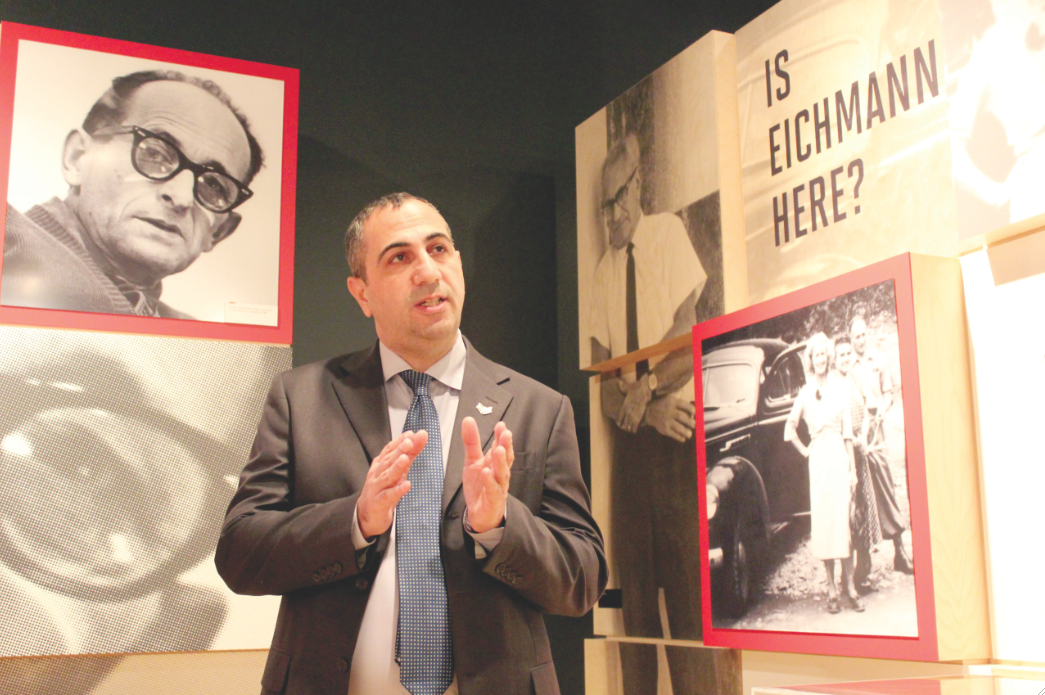Story by Bob Abelman
Every year, local professional theater companies devote themselves to putting on the best shows possible. Although some companies have deeper pockets, more Actors’ Equity contracts or a grander facility than others, talent makes itself known and creativity always rises to the surface no matter the pay scale and or venue.
The Cleveland Jewish News is recognizing excellent productions and performances from the past year. As reflected in the breadth of this year’s award recipients, it is clear there’s no shortage of either across our local stages.
Only those professional productions originating in or staged by local troupes in and around the Greater Cleveland area are taken into consideration. Most performances were reviewed during their opening weekend.
Best Drama
“The Royale,” Cleveland Play House, New Ground Theatre Festival

Howard Sackler’s “The Great White Hope” offered a dramatization of the real life struggles – the demonization, the racism, the ridicule – of boxer Jack Johnson after becoming the first African-American heavyweight champion of the world at the start of the 20th century. Marco Ramirez’s “The Royale” explored the personal demons Johnson encountered on his way to that championship fight.
The play was spartanly staged in the round and given an expressionistic theatricality to complement the heightened speech that served as the internal voices and surreptitious exchanges in the clutch by our fictionalized Jack Johnson, named Jay (Preston Butler III), and fellow boxer Fish (Johnny Ramey), as well as an occasional rhapsodic monologue by Jay’s trainer Wynton (Brian D. Coats) and sister Nina (Nikkole Salter), and clipped play-by-play accounts of the boxing matches by promoter Max (Leo Marks). Everything was propelled forward and given emotional punch by director Robert Barry Fleming, who did not give the audience an opportunity to exhale during this intense, highly sensorial production.
Best Comedy
“Bloomsday,” nonetoofragile theater

Dramatists Play Service, which handles the rights to Steven Dietz’s “Bloomsday,” lists it as a drama. In it, Robert (Tom Woodward) returns to Dublin 35 years after he met a young girl leading a “Ulysses” literary pub crawl who he never forgot, regrets never pursuing, and wishes to find. He does, but she is her younger self (Brooke Turner). And his younger self also shows up (Nicholas Chokan). So does her older self (Derdriu Ring). Rather than revisiting a city, he inexplicably revisits a moment in time and gets to relive – as do we all – the longing beautifully captured in Joyce’s words: “Wait. I wanted to. I haven’t yet.”
Under Katia Schwarz’s velvet-gloved direction and bare-boned scenic design, Dietz’s keen wit, intricate cleverness and romantic comedy tendencies were placed center stage. This production was as funny as it was touching – an ode to the ache of regret that would have left the audience crying if it weren’t for all the laughing.
Best Musical
“Passing Strange,” Karamu House

There is no shortage of coming-of-age memory plays, where an older character sentimentally reflects back on the trials and tribulations of his or her younger self. But this one is an autobiographical fiction written by rock ’n’ roller Stew and his bandmate Heidi Rodewald. More punk rock performance art than traditional musical, the show interweaves song, verse and dialogue, and received an engaging production at Karamu under Nathan Lilly’s direction.
Each song was supported by an outstanding on-stage band (Ed Ridley, Jr., Elijah Gilmore, Kevin Byous, Bradford L. Mc Gee, and vocalist Chantrell Lewis) and performed by an exceptionally talented cast (Darius J. Stubbs, Justin C. Woody, Carlos Antonio Cruz, Joshua McElroy, Mary-Francis Miller, CorLesia Smith and Treva Offutt). The show took place on a two-tier stage void of storytelling trappings, which left the performances and Rob Peck’s lighting and sound design to fend for themselves. Which they most certainly did.
Best Director of a Drama
Donald Carrier, “Who’s Afraid of Virginia Woolf?”, Beck Center for the Arts

Edward Albee’s 1962 drama invites audiences to be a collective fly on the wall of George and Martha’s modest home to witness their cruel psychological warfare. By hosting the play in the intimate Studio Theater rather than on its larger main stage, the Beck Center for the Arts put the audience directly in the line of fire. So close were the performers – made even more so by director Donald Carrier’s tendency to push them to the edge of the performance space and the brink of insanity – that there should have been a splash zone for the flying gin and exploding tempers.
By matching superb performers (Derdriu Ring, Michael Mauldin, Daniel Telford and Becca Ciamacco) with detailed scenic and lighting design (Aaron Benson and Adam Ditzel, respectively) and some of the best writing in the American theater, Carrier created a perfect storm on the Lakewood theater stage.
Best Director of a Comedy
Terry Burgler, “Scapin,” Ohio Shakespeare Festival

Molière’s 347-year-old commedia dell’arte-inspired farce, “Scapin the Schemer,” offers highly predictable and recognizable stock characters – the hopeless lovers, the sad misanthrope, the elderly miser – engaged in highly comedic domestic conflicts in desperate need of outrageous resolution. The play has been often translated and tailored, most recently by Ohio Shakespeare Festival artistic director Terry Burgler, whose production was performed under his ambidextrous direction and with the wonderful Ryan Zarecki in the title role.
In a play like this, it is all too easy to emphasize the storytelling – the slapstick clowning, the embellishment of running gags, the punching of punchlines – over the story beneath it all. Not here. Though wonderfully raucous and never missing an opportunity for a laugh, Burgler’s production never lost sight of or its grip on these characters’ passions and what they want most out of life. And he created a production that generated laughter as a satisfying response rather than an automatic reflex.
Best Director of a Musical
Patrick Ciamacco, “We Will Rock You,” Blank Canvas Theatre

Ben Elton’s musical “We Will Rock You” tells the campy, sci-fi-inspired tale of a small group of rebels in a highly corporatized dystopian future who are looking for a savior to revive the lost poetry once known as rock ‘n’ roll. The show uses the songs of Queen as both its soundtrack and the resistance fighters’ sacred text. It all sounds ridiculous, but this musical is a marvelous confection in the hands of Blank Canvas director Patrick Ciamacco, who has a gift for turning idiotic, idiosyncratic works (“Psycho Beach Party,” “The Texas Chainsaw Musical”) into surprisingly entertaining enterprises. His effort is bolstered by a cast of fierce rock ‘n’ rollers (Danny Simpson, Neely Gevaart, Neda Spears, Kate Michaelski, Tony Heffner, Mikey Silas) with tongues pressed firmly in cheeks and who play in a space with low-budget production values intended to have no loftier aspirations.
Best Musical Director
Jennifer Korecki, “Oklahoma,” Porthouse Theatre

In 2013, Porthouse Theatre staged a performance of “South Pacific” with only two pianos to deliver Rodgers and Hammerstein’s compositions, which failed to carry the audience to the sandy beaches of Bali Ha’i and communicate the emotional highs and lows of its occupants. For Rodgers and Hammerstein’s “Oklahoma!” Jennifer Korecki had at her disposal a wonderful 12-piece orchestra that, under her musical direction, filled the 500-seat open-air pavilion with the rich sound of cowhands and farmers finding love and community in the Oklahoma territory at the turn of the 20th century. Korecki’s efforts put the giddy-up back in the gait of audiences still in state of second-hand depression after seeing the marvelous but mournful Porthouse production of “Next To Normal.”
Best Choreography
Jaclyn Miller, “Mamma Mia!”, Great Lakes Theatre

The mother of all jukebox musicals, Benny Andersson and Björn Ulvaeus’ “Mamma Mia!” consists of a paper-thin storyline used to string together over 20 of ABBA’s eclectic 1970s disco tunes that move the story but mostly serve as effervescent storytelling. The production numbers they become in this musical require dance as diverse as they are and choreographer Jaclyn Miller was up for the challenge.
As with her recent productions of “The Music Man” at the Arizona Theatre Company and an audacious same-sex rendition of “Oklahoma!” at The Oregon Shakespeare Festival, Miller’s approach to dance in “Mamma Mia!” was a joyous expression of life lived to its fullest, which is pretty much the mantra of this musical under Victoria Bussert’s brilliant direction. From the energetic disco moves in “Dancing Queen” to the ballet-infused movement in “Under Attack,” this musical was as fun to watch as it was to listen to.
Best Performance by an Actor in a Drama
Lynn Robert Berg, “Macbeth,” Great Lakes Theater

In 2008, Great Lakes Theater’s production of “Macbeth” embraced classic Japanese styles, sensibilities and theater traditions, and was underscored with live percussion based on the bold rhythms of Taiko drummers. The Far East met the Thane of Scotland. Not in this year’s production under Charlie Fee’s direction. Here, the production resembled what one would imagine to be the original performance of the tragedy in 1606, though a few hidden technological bells and whistles helped create the illusion. And Lynn Robert Berg, who played Banquo in the 2008 production, was brilliant as Macbeth.
In the program notes, Fee remarked that Shakespeare wrote Macbeth as a character plagued by an inability to stop himself from thinking forward and projecting himself through a future that is dangerous and problematic. Berg’s every expression, every movement, hinted at this and then he would recoil in pain and self-consciousness when he realized that it has. A brilliant performance from start to tragic finish.
Best Performance by an Actress in a Drama
Anjanette Hall, “Grounded,” Dobama Theatre

In local playwright George Brant’s one-woman drama, Anjanette Hall played an ace Air Force pilot whose career flying an F-16 into combat is scuttled due to an unexpected pregnancy. Her performance of 90 minutes of uninterrupted epic poetry that transformed the literal into the abstract was absolutely spell-binding. Her masculine physicality, foul mouth and confident swagger got our initial attention. But it was Hall’s attention to small details in her phrasing and pacing, under Alice Reagan’s direction, that held it, and it was the emotional fragility that slowly took over that kept our eyes riveted to the stage.
Best Performance by an Actor in a Comedy
Abraham McNeil Adams, “Appropriate,” Dobama Theatre

Branden Jacobs-Jenkins is a Pulitzer Prize finalist and MacArthur Fellow “genius” grant recipient who the New Yorker compared to Sam Shepard, Eugene O’Neill, Tracy Letts and Tennessee Williams. It all shows in the brilliant prose and poetry that fill the dialogue in the dark comedy “Appropriate,” with Abraham McNeil Adams being a primary recipient in the role of Franz. The play begins after the patriarch of a white Arkansas family has died in his run-down ancestral plantation home and his grudge-bearing adult children (Tracee Patterson, Tom Woodward and Adams) and their families (Ursula Cataan, Kelly McCready, Ireland Derry, Miles Pierce) arrive to divide the estate. Adams played the black sheep of the family and did so, under Nathan Motta’s direction, with a wonderful vulnerability that had the audience laughing with him as much as it laughed at him.
Best Performance by an Actress in a Comedy
Jeanne Madison/Rebecca Morris/Kimberly Sias, “Sassy Mamas,” Karamu House

Celeste Bedford Walker’s “Sassy Mamas” revolves around three female best friends in the autumn of their lives who are in search of May-December relationships on their own terms. This risqué romantic comedy is all about female empowerment in the boardroom and the bedroom, with the young men in it providing shirtless fantasy fodder and the older men serving as the sagging butt of jokes. This production, directed by Tony Sias, boasted absolutely charming and immediately endearing performances by Jeanne Madison, Rebecca Morris and Kimberly Sias. Each handled the show’s comedy and poignancy with equal aplomb and had the largely female audience eating out of their hands. Mid-life men were wise dropping off their wives at the theater entrance and finding safe-haven elsewhere for two hours.
Best Performance by an Actress in a Musical
Amy Fritsche, “Next to Normal,” Porthouse Theatre

Patrons who were enchanted by the welcomingly escapist production of “Anything Goes” that opened Porthouse Theatre’s summer season experienced severe vertigo during “Next To Normal.” Brian Yorkey and Tom Kitt’s musical is about a contemporary American family crippled by mental disease. It offers a portrait of a chronically manic-depressive, delusional mother and how this disease infiltrates and infects her compassionate husband and teenage daughter. As the mother, Amy Fritsche was astounding as she went through Diana’s motions of next to normalcy that dragged her shell of a self from one attempted medical treatment and one musical number to another. Her powerful, crystal clear voice is still echoing in the rafters of the Porthouse amphitheater and in the heads of theatergoers fortunate enough to have bought a ticket.
Best Performance by an Actor in a Musical
Eric Damon Smith, “Mamma Mia!”, Great Lakes Theater

In his years with Great Lakes Theater, you may remember Eric Damon Smith from the comedies “Blithe Spirit” and “As You Like It” or the dramas “Richard III” and “Pride and Prejudice.” But unlike some other members of the repertory company who are trained in the classics but thrown into the occasional musicals, Smith was in his natural element in “Mamma Mia!” He played Harry, former head-banging musician and one of the three men Sophie invited to her wedding to discover the identity of her father. Smith, with his gorgeous voice and graceful movement, added much to the lighter-than-air ambiance that drives this silly musical and did so effortlessly. The Broadway tour of “Mamma Mia!” came through Playhouse Square six times, but it is unlikely that anyone has seen a Harry as thoroughly endearing and engaging as Smith’s.
Best Performance by an Ensemble
“Mamma Mia!”, Great Lakes Theater

“Mamma Mia!” is a global smash hit but I have not been a fan. Not a fan of the music of Swedish band ABBA. Not a fan of kitschy jukebox musicals. But it all worked in Great Lakes Theater’s staging under Victoria Bussert’s direction who, as director of Baldwin-Wallace University’s top-ranked music theater program, filled the sizable ensemble with triple-threat undergraduates. Shayla Brielle G., Kelsey Brown, Warren Egypt Franklin, Tre Franklin, Courtney Hausman, David Holbert, Amy Keum, Matt Koenig, Daniel Millhouse and Mack Shirilla brought personality, energy and a mastery of Jaclyn Miller’s athletic choreography to the Hanna Theatre stage. Their skills were best showcased in “Does Your Mother Know” and “Under Attack,” which pretty much stopped the show.
Best Design – Scenic
“Appropriate,” Dobama Theater

As previously noted, Branden Jacobs-Jenkins’ play begins after the patriarch of a white Arkansas family has died in his run-down ancestral plantation home and his three grudge-bearing adult children arrive to supervise the auction of the home and the dividing of the estate. The family’s historical toxicity is evident in the decaying, mold-covered walls of the Southern Gothic mansion designed by Cameron Michalak, which then brilliantly self-destructed at the end of the play to depict the future of the house once its occupants and its racist history have been exorcised.
Best Design – Lighting and Sound
Benjamin Gantose (lighting) / Carlton Guc (sound) “Jane Eyre,” Cleveland Musical Theatre

Any stage version of a weighty, timeworn Victorian novel is likely to come up comparatively short in terms of content, context and authorial voice. Such complex storytelling is not easy to capture in the short form typical of live theater. To compensate, the new streamlined rendition of Paul Gordon and John Caird’s musical “Jane Eyre” – which received its world premiere by Cleveland Musical Theatre, a recently-formed professional production company – saturated the stage with extraordinary and ominous theatricality courtesy of impressive stagecraft. Benjamin Gantose’s gothic lighting design was instrumental in capturing the tenor of Eyre’s memories, resulting in a dark, delicate and disarming musical.
Best Design – Projections
T. Paul Lowry, “Ella Enchanted,” Dobama Theater

In the cinematic Disney version of “Cinderella,” it’s possible for a plain yellow pumpkin to become a golden carriage and a plain country bumpkin and a prince to join in marriage. But the true bibbidi-bobbidi-boo to be found in Dobama’s rendition of the knock-off musical “Ella Enchanted,” under Nathan Motta’s fairy godmother-like direction, is the turning of something middling (the script and score) into something magical (this production). This was largely accomplished by
T. Paul Lowry’s animated images of big skies and sweeping landscapes that were projected on a rear screen and other imagery projected on the proscenium. All this helped transport the audience to an inviting and absolutely enchanting world set for storytelling.
Congratulations to those recognized and to all those others who delivered wonderful work that enriched our lives.
Bob Abelman covers professional theater and cultural arts for the Cleveland Jewish News. Follow Bob at Facebook.com/BobAbelman3 or visit cjn.org/Abelman. 2018 Ohio AP Media Editor’s best columnist.
Originally published in the Cleveland Jewish News on Dec. 21, 2018.











